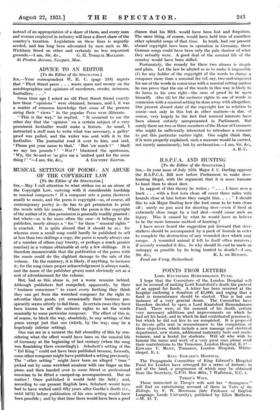MUSICAL SETTINGS OF POEMS : AN ABUSE OF THE COPYRIGHT
LAW [To the Editor of the SPECTATOR.] SIR,—May I call attention to what strikes me as an abuse of the Copyright Law, carrying with it considerable hardship to musical composers ? If a composer sets a poem (however small) to music, and the poem is copyright--as, of course, all contemporary poetry is—he has to get permission to print the words with his music. Where the poem is the copyright of the author of it, this permission is generally readily granted ; but where—as is far more often the case—it belongs to the publisher, nearly always a " fee " for these " musical rights " is exacted. It is quite absurd that it should be so ; for whereas even a small song could hardly be published to sell at less than two shillings a copy, the poem is nearly always one of a number of others (say twenty, or perhaps a much greater number) in a volume obtainable at only a few shillings. It is therefore inconceivable that the publication of the poem with the music could do the slightest damage to the sale of the volume. On the contrary, it is likely, if anything, to increase it ; for the song (since proper acknowledgement is always made, and the name of the publisher given) must obviously act as a sort of advertisement for the volume.
But, bad as this abuse is, yet a worse remains behind. Although publishers feel compelled, apparently, by their " business conscience " to exact every farthing they think they can get from the wretched composer for the right to advertise their goods, yet occasionally their business per- spicacity seems utterly to fail them. In certain cases they have been known to sell the exclusive rights to set the words musically to some particular composer. The effect of this is, of course, to block the way, absolutely, to any settings of the poem except just that one (which, by the way, may be a hopelessly inferior setting).
One can see in a monent the full absurdity of this by con- sidering what the effect would have been on the musical life of Germany at the beginning of last century (when the song was flourishing there exceedingly). Schubert's setting of the " Erl King " could not have been published because, forsooth, some other composer might have published a setting previously. The " other setting " might have been an alleged " tune " picked out by some wretched amateur with one finger on the piano and then handed over to some friend or professional musician to be fitted a vamped-up accompaniment. But no matter ! Once published it would hold the field ; and, according to our present English laws, Schubert would have had to have waited until fifty years after Goethe's death (i.e., until 1872) before publication of his own setting would have been possible ; and by that time there would have been a good chance that his. MSS. would have been lost and forgotten. The same thing, of course, would have held true of countless other splendid songs of that time. In truth, had our present absurd copyright laws been in operation in Germany, these German songs could have been only the pale shadow of what they actually were. A good deal of the musical life of the country would have been stifled.
Fortunately, the remedy for these two abuses is simple and plain. Let the law be altered so as to make it impossible (1) for any holder of the copyright of the words to charge a composer more than a nominal fee (of, say, two-and-sixpence) for use of the words in connexion with a musical setting (unless he can prove that the use of the words in this way is likely to do harm to his own right—the onus of proof to be upon himself). Also (2) let the exclusive rights to use of words in connexion with a musical setting be done away with altogether. Our present absurd state of the copyright law in relation to music—not only in this but in other matters—is due, of course, very largely to the fact that musical interests have been almost entirely unrepresented in Parliament. But surely there are two or three members of the House of Commons who might be sufficiently interested to introduce a measure to put this particular matter right. One might think that, if it were properly explained, such a measure would be carried, not merely unanimously, but by acclamation.—I am, Sir, &c.,
A. R. C.






























 Previous page
Previous page